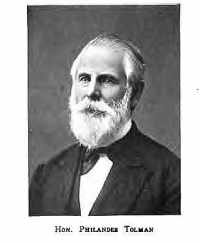Philander Tolman
13 Jun 1820 – 30 Aug 1897
Son of Henry & Mary Harrison Tolman
Philander Tolman was a descendant of Revolutionary War stock. His great grandfather, Jacob Newhall, was in the Revolutionary Army. He witnessed the surrender of Burgoyne and was in the army five years. His grandfather, Benjamin Tolman, also was in the Revolutionary War at Bunker Hill and at Stillwater, near Saratoga.
In the battle of Bunker Hill he was in the thickest of the fight In a hand to hand conflict his gun was wrenched from him by a British soldier, but he stood his ground, defending himself with the weapons nature had furnished him until his captain, seeing his situation, brought him another musket, with which he continued to fight until ordered to retreat. He was born in Dorchester, Massachusetts, and the house where his birth occurred, known as the old Tolman residence, is still standing, and has been occupied by successive generations of the Tolman family ever since the days of the Revolutionary War.
Philander Tolman received his early education in the public schools of his native county. When a boy he worked for his father in the pottery business. At the age of fifteen he was the captain of the Washington Artillery Company. At the age of seventeen he went to Worcester, Massachusetts, and entered the Washburn Wire Mills as an apprentice. There he remained twelve years, becoming a most skilled workman. In 1848, he came to Harrison, which was then a small, struggling village, formed a partnership with Charles Farley, and entered into the manufacture of all kinds of iron and steel wire, the firm being known as “Farley & Tolman.” Five years later the firm was dissolved, and for a few months the business was carried on by Charles Farley & Sons. Jacob Hazen took .the business in 1855, with Mr. Tolman as manager, and continued it until some time in 1857, when he sold out to the new firm of P. Tolman & Co., which was composed of Philander, Tolman, Franklin Walker, and John W. Caswell. Under the management of this firm the business grew such proportions that it became necessary to increase the size of the buildings, and in 1865, the new wire mill was built, which became the home of a large and thriving industry, and as the business grew, so grew the town. This firm continued the manufacture of wire until 1887, when the business was closed up, Franklin Walker having previously died in 1884. The chief reason for the discontinuance of the business here was the fact that changes in regard to the manufacture of wire in other parts of the country had made the making of it in Maine an unprofitable business.
In 1870, Mr, Tolman erected the mansion known as “Greenwood Villa,” which was his home until his death In 1897, and which is now the home of his daughter, Mrs. Anna Dudley. During the last few years of his life he carried on the manufacture of bricks, the brickyard being a short distance to the north of his residence.
In politics Mr. Tolman was an ardent Republican, and he was also an earnest worker in the temperance cause. In 1860, he was elected as Representative to the Legislature from the district composed of Bridgton and Harrison, and in 1878-79, he was elected as a State Senator by the Republicans of Cumberland County. For many years he was prominent in all town affairs, was Chairman of the Selectmen in 1862, and served as Moderator at nine Annual Town Meetings.
He was always active in educational matters, and could always be relied upon to speak and act on the side of progress and liberality. His interest was not confined to the town schools, but extended to the higher schools, and Bridgton Academy in particular. In 1866, he was elected as a Trustee of that institution, to fill the vacancy on the Board caused by the death of Dr. Nathaniel Pease. He continued to hold the position for twenty-nine years, and was an active member of the Board as long as his health permitted him to attend the meetings. For nineteen years he filled the position of Treasurer, and was elected for the twentieth time, but failing health obliged him to resign from the Board in 1895, and George H. Greene was chosen as his successor.
He was always an active worker in religious matters. He united with the Baptist Church in Worcester, Massachusetts, in 1837. During the years of his residence in Harrison, he labored with much zeal for the welfare of the Baptist Church, and contributed liberally towards its support. He was mainly instrumental in causing the removal of the Baptist meeting-house from its first site, and the building of the new one in the center of Harrison Village. In connection with this enterprise he expended considerable money for the re-establishment of the church of his faith in a locality, and under conditions, deemed more favorable than it had ever known before. For several years after the completion of the new church there was regular preaching and a Sunday-school in the church, but of late years no pastor has been employed, and, with no leader like the late Mr. Tolman, the Baptist Church of Harrison, once a living and effective power in religious reform, and with a large membership, has been compelled to suspend its visible operations as a branch of the great Protestant church organizations.
(The church building in Harrison Village spoken of above has for many years been unoccupied and going to decay. Less than forty-eight hours before this sketch of Mr. Tolman is being finally revised the building was totally destroyed by fire, and there was no insurance upon the structure. — EDITOR.)
Centennial History of Harrison, Maine
Golden Wedding
November 3, 1891, marked the fiftieth year of the married life of Philander and Laura (Kelton) Tolman. The anniversary was honored by the presence of a large assemblage of their descendants and other relatives and friends – about seventy-five in all. The mansion, “Greenwood Villa,” and lawn were illuminated by Chinese lanterns, the parlors…
Visit FamilySearch to learn more about Philander Tolman. Also visit the Thomas Tolman Family Organization to find out how you can get more involved in family history.


